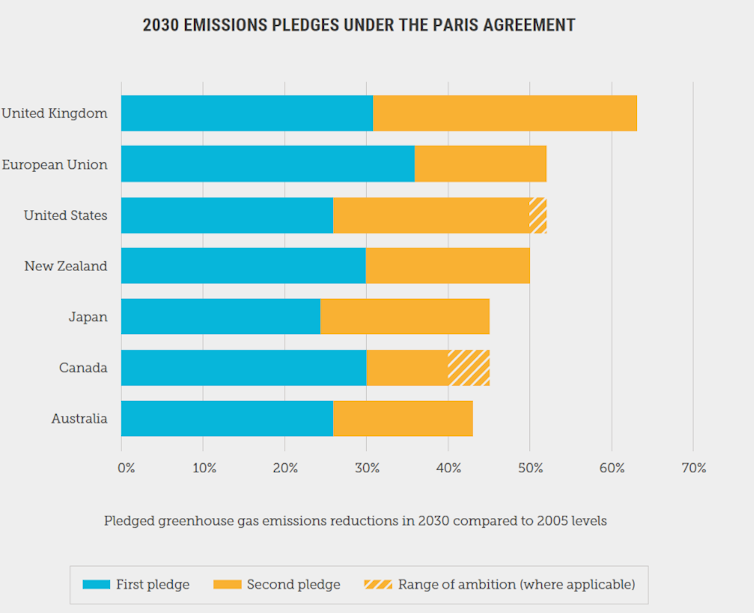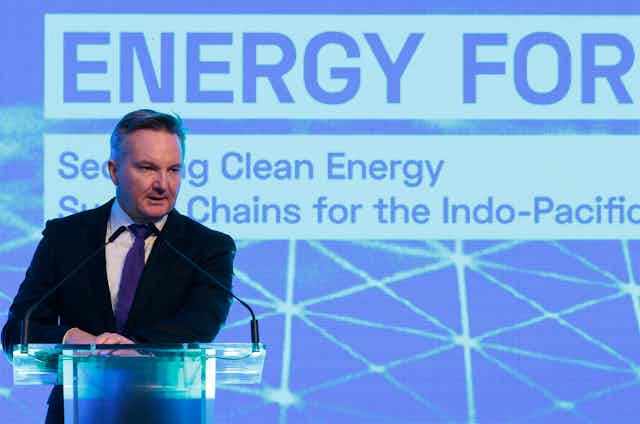Officials from nearly 200 nations are gathering in Sharm-El-Sheikh, Egypt, for the 27th United Nations climate change conference known as COP27. Multiple global crises threaten to overshadow the summit, but the task at COP27 over the next two weeks is more urgent than ever.
A report released today by the Climate Council shows the world is in the grip of a deepening climate crisis. Without more ambitious emission cuts this decade, we are headed for a full-blown catastrophe.
In this time of global volatility, Australia can play a key role. At COP27, Australian officials will be lobbying to co-host the UN climate talks with Pacific island countries.
But, to succeed in its bid, Australia will need to walk the talk. That means moving rapidly away from coal and gas, and helping developing nations to manage climate impacts.
Read more: 3 things a climate scientist wants world leaders to know ahead of COP27
Australia must show more ambition
After a decade of denial and delay, Australia has rejoined the global shift toward a clean energy economy. However, Australia’s new 2030 target – to cut emissions by 43% from 2005 levels – is still one of the weakest in the developed world. And dozens of major fossil fuel projects remain in the pipeline.

More ambition is needed. At COP27, Climate Change and Energy Minister Chris Bowen has a chance to signal that Australia intends to become a renewables superpower, exporting the clean energy commodities and critical minerals other nations need to decarbonise their economies.
Australian diplomacy matters too. Australia is formally bidding to host a future round of UN climate talks, for the first time, in partnership with Pacific island nations. But a bigger role will come with bigger expectations.
To demonstrate Australia’s climate credentials, Bowen will need to explain that our 2030 target is just a starting point. Pacific island nations will want to see Australia end public finance for fossil fuels and join the growing list of countries that have set a clear deadline for exiting coal.
Australia will also be expected to commit more climate finance for developing countries and support a new global fund to address permanent loss and damage from climate change.
Read more: Famine should not exist in 2022, yet Somalia faces its worst yet. Wealthy countries, pay your dues
With a responsible international climate agenda, Australia could play a crucial role reinforcing global co-operation and brokering the next phase of climate action.
We need delegates and world leaders to stay focused at COP27. Distraction will be deadly.
A world of climate suffering
Extreme weather records were broken on every continent this year. From Lismore to Lahore, records tumbled so fast it was hard to keep up.
Australia recorded its equal-hottest day on record and its costliest flood disaster.
China endured its most intense heatwave. In Pakistan, extreme floods affected more than 30 million people and killed thousands.
Europe’s hottest summer on record smashed the record from just last year. The continent also suffered one of its worst ever droughts. UK temperatures topped 40°C for the first time.
The western United States also recorded its worst heatwave.
In South Africa, record rainfall led to hundreds of deaths. Drought in East Africa has left millions at risk of starvation.
These climate impacts, sadly, are just the beginning. They are occurring in a world that has warmed 1.2°C since the Industrial Revolution, but it’s going to get worse. Even if all countries meet their targets for emission reductions by 2030, the world is headed for 2.4-2.6°C of warming this century.
Deeper cuts to emissions this decade can avoid worst-case scenarios. But we must act now. Global emissions must fall by 45% by 2030 to have any chance of achieving the Paris Agreement goal of limiting warming to 1.5°C.
Geopolitics is driving clean energy race
Even while climate records tumble, world leaders are focused on strategic rivalry between nations. It’s not all bad news, however. While competition may undermine joint action, it is also speeding up the shift to clean energy.
The United States and China are competing to lead this transition.
China is the world’s largest emitter and relies heavily on coal-fired power, but it’s also the global leader in clean energy production and deployment.
Last year China built nearly half the world’s new renewable energy infrastructure. China also dominates global production of solar photovoltaics, batteries, wind turbines and electric vehicles.
In September, the US Congress passed legislation authorising the largest climate spend in US history. The intention is to establish a clean energy manufacturing base in the US, and to displace China as a key supplier of components for solar, wind, batteries and electric vehicles.
In Europe, Russia’s invasion of Ukraine has sped up the move away from fossil fuels, as it’s now also an issue of security. In May, the European Union set out a plan to cut Russian gas imports by two-thirds this year and end them altogether before the decade is out.
The strategy will cut Europe’s overall gas use — not just Russian gas — by a third by 2030. It also sets more ambitious 2030 targets for renewable energy and energy savings, and requires rooftop solar installations on new buildings.
As a result, the EU is expected to exceed its 2030 emissions target. European policymakers have agreed to formally strengthen the target next year.
Competition among major powers is clearly accelerating, not slowing, the shift to clean energy. A majority of countries — representing more than 90% of the world economy — have committed to achieving net-zero emissions. Most of the developed world has pledged to at least halve emissions this decade.
Australia is well placed to benefit from the global clean energy transition. At COP27 we must signal our shift from fossil fuel heavyweight to renewables superpower.

